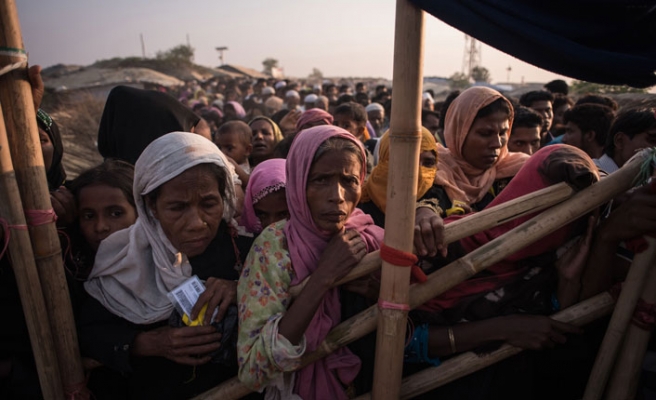UN Rights Council backs Rohingyas
October 1, 2018 | Expert Insights

The United Nations (UN) Human Rights Council has advanced justice for victims of grave crimes in Myanmar by creating an international body to help prepare case files for future criminal proceeding.
Background
The Rohingya are a Muslim minority group in predominantly Buddhist Myanmar, concentrated in the western state of Rakhine. The Myanmar government regards the Rohingya as illegal immigrants from the Indian subcontinent and refuses to grant them citizenship status, effectively making them stateless. They cannot travel, get married or seek medical treatment without official permission. Many reports say that Rohingyas also face persecution, forced labour, land confiscation and limited access to education.
Analysis
The U.N. Human Rights Council will form an international body to prepare evidence of human right abuses in Myanmar, including that of possible genocide for any future prosecution.
“The Human Rights Council took an important step for justice by creating a body to pinpoint criminal responsibility for the countless atrocities in Myanmar,” said John Fisher, Geneva director at Human Rights Watch. “It deals a blow to Myanmar’s deep-seated culture of impunity and moves victims closer to seeing Myanmar’s generals held to account.”
The creation of the new body marks a major step toward criminal prosecution over the violence that caused more than 700,000 Rohingya to flee across the border into Bangladesh since August last year, many alleging army abuses such as arson, rape and murder. The resolution will set up the body to "collect, consolidate, preserve and analyse evidence of the most serious international crimes and violations of international law committed in Myanmar since 2011, and to prepare files in order to facilitate and expedite fair and independent criminal proceedings". The UN council passed the resolution in a joint initiative with the Organisation of Islamic Cooperation and the European Union.
35 of the council’s 47 members voted in favour of the resolution while three - China, the Philippines and Burundi voted against the move. China’s foreign minister, Wang Yi said at the UNGA that China does not approve of internationalising the Rohingya issue. China has close relations with Myanmar and backs what the Myanmar officials call as a legitimate counterinsurgency operation. Beijing has helped to block a resolution on the crisis at the U.N. Security Council.
The United States Department released a report describing the gross abuses as “ethnic cleansing” while the United Nations report said that Myanmar’s military carried out mass killings and gang rapes of Rohingya with “genocidal intent”, a charge Myanmar rejects, blaming Rohingya “terrorists” for most accounts of atrocities. Myanmar, which barred the investigators from their country, has rejected this reporting as “replete with unverified information.”
There are 1.1 million Rohingya refugees who have taken shelters in Bangladesh. Bangladeshi President Sheikh Hasina accused Myanmar of failing to honour a verbal commitment to take back Rohingya Muslims who have fled a crackdown. Her remarks at the UNGA backed the UN report calling it “genocide and crimes against humanity”. She has appealed for international support and for a swift and peaceful solution. Most of the refugees came to Bangladesh when attacks by Rohingya militants on Myanmar security forces triggered a massive retaliation that prompted a cross-border exodus of civilians. China plans on providing a platform for resolution between Myanmar and Bangladesh.
Canada has revoked the honorary citizenship of Myanmar’s leader Aung San Suu Kyo in response to the alleged atrocities committed against the Rohingya minority. Human Rights attorney, Amal Clooney. representing two Reuters journalists who are sentenced in Myanmar urged the leader to pardon them. The International Criminal Court in the Hague in independently ruled that it had jurisdiction to open a preliminary investigation.
Assessment
Our assessment is that in the recent United Nation General Assembly, the Human Rights discussion focussed on two human rights issues which are the treatment of Uyghurs in China and Rohingyas in Myanmar.
We believe that by raising the profile of the discussions in the General Assembly, the Fact Finding Mission intends to signal to the world that human rights and justice must be an integral part of any proposed solution to Myanmar’s devastating rights crisis.








Comments